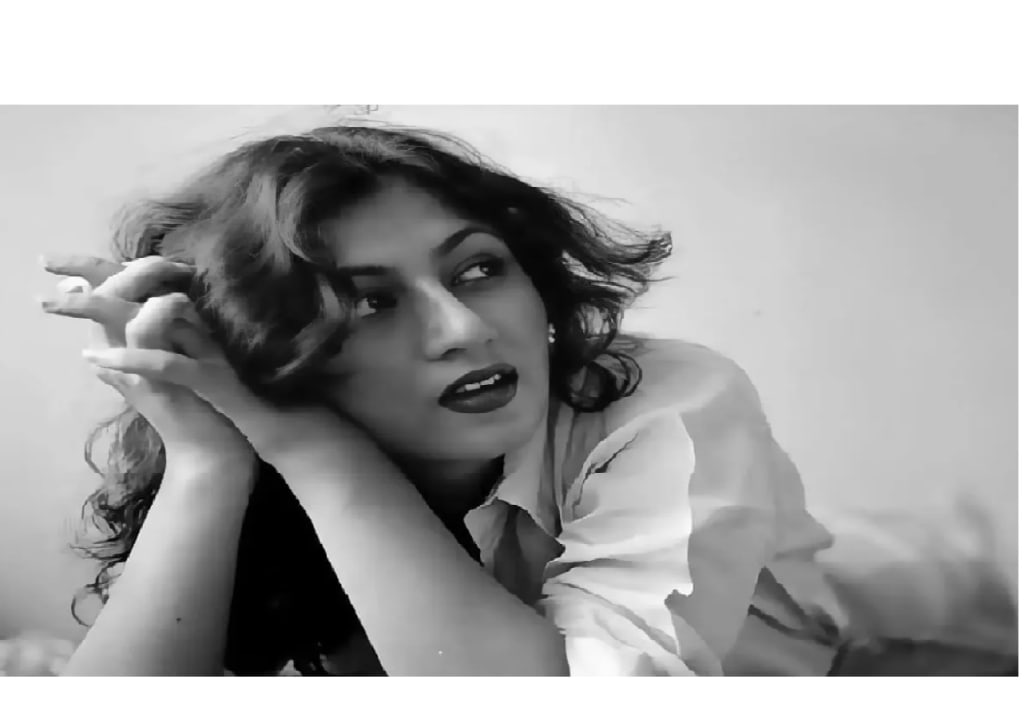BOLLYWOOD WITHOUT MADHUBALA
February 23rd, this year, will mark the 55th. death anniversary of a truly iconic star.

February 23rd. this year will mark the 55th. Death anniversary of a truly iconic star of the Urdu, Hindi cinema of Bollywood. Venus of the Indian screen. As she was called. Madhubala died merely a nice days after her 36th. Birthday. Her innumerable admirers were spared of watching the ravages of time affect her beauty. In this, she was like Marilyn Monroe. But that is where the similarity ends. Monroe was a sex symbol.
A seductress. Madhubala's attractiveness was a sex symbol, A seductress. Madhubala’s attractiveness was predicated on innocence, but she was also a great performer and had a wide range of expressions as her command. She played a teasing comedienne in movies such as ‘Chalti ka Naam Gaari’ (1958) as convincingly as she did when she appeared as a tragedy-struck courtesan in K. Asif’s magnum opus Mughal-e Azam (1960).
The star, who sought love all through her life, ironically enough born on St. Valentine’s Day in Delhi in 1933 in a large lower-middle-class family. Named Mumtaz Jahan Begum. She took part in children’s radio programs when she sang for no less a composer than Khurshid Anwar.
Her histrionic talents were discovered by Rai Bahadur Chunni Lal, the General Manager of Bombay Talkies. Who was instrumental in bringing her, along with her? Along with her father. To Devika Rani, the owner of the studios. While only eight. Baby Mumtaz, Shanti and Ulhas. Which she did with her innate confidence. She was instrumental in bringing her estranged parents together in the film. The movie, ‘Basnat’ (1942). Ran for 76 weeks and proved to be a huge success commercially. The barely nine-year-old was asked to record two sons in her voice, one of which - ‘Mere chhotay se mun meian, Chhoti si dunya re’ was quite hit.
Madhubala’second movie was Mumtaz Mahal (1947), directed by Stalwart Kedar Sharma. She was assigned the role of the daughter of Jahan Ara. The daughter the role of the Moghul emperor Shahjahan. Its success motivated Madhubala's father, Attaullah Khan, to move to what is now Mumbai. Four films later Sharma gave Mumtaz Johan Begum her first role as a heroine in Neel Kaval (1947). This was also when she acquired the name Madhubala. Sharing the marquee with her was another newcomer. Raj Kapoor, who had until then assisted Kadar Sharma.
Madhubala appeared in 12 more films, none of which was mega success until she appeared in Bombay Talkies’ Mahal (19949). A fantasy, the film established her as a top-ranking star., just as it reconfirmed Ashok Kumar as one of the major actors, and Kamal Amrohi and Khem Chand Prakash as a talented director and composers respectively.
As the name Mahal crops up, one cannot help drifting down melody lane. The mellifluous number ‘Aayega, Aayega aanay wal’ penned by Nakhshab, also established Lata Mangeshkar as Numero uno in the field of playback singing. After that, there was no looking back for the two ladies.
Madhubala then shared stellar honors with two top stars, with Dilip Kumar in ‘Tarana’ (1951) and a few comedies with Dey Anand. At the level of realism, ‘Tarana’ left much to be desired but, in the field of romance, there have been few parallels, mainly perhaps because the two lead players seemed to have fallen in love during the film’s shooting.
A year later came ‘Sangdil’, which was an adaptation of Emil Bronte’s novel Wuthering Heights. Madhubala and Dilip Kumar had by then formed a team whose popularity equaled, if not excelled, the fame of the Nargis-Raj Kapoor pairing.
Mahboob Khan’s Amar (1954) was the third movie to feature them. The thought-provoking flick also featured Nimmi, who falls prey to Dilip Kumar’s moment of weakness. He regrets it. but all in vain. When Madhubala comes to know of her beloved’s misdeed, she convinces him to leave her and take Nimmi to the altar. Mehboob’s directorial skills.
Naushad’s haunting musical score and the fine performance of the actors were, however, unable to save Amar at the box -office. The theme was too mature for the ‘50s, a time when the hero was uniformly portrayed as an unstained character.
In the meanwhile, K. Asif got Madhubala to play Anarkali with Prithvi Raj as Emperor Akbar and Dilip Kumar as his rebellious son. One would need a separate piece to write about the performances of people who contributed their might to make ‘Mughal-E-Azam’ an all-time classic.
The love scenes were intensely performed, even though the lead players were not on talking terms with each other because of the differences that had arisen between them over the shooting of ‘Naya Dour’ (1958). But love had not evaporated from their hearts.
Spontaneity, which was the hallmark of Madhubala's personality. Was on full display in her assignments. Be it her impish look or her radiant smile. Everything came to her naturally. ‘Chalti Ka Namm Gaarri’ and ‘Half Ticket’ (1962) were two comedies she did with Kishore Kumar, with whom, by the way, she got married out of sheer desperation. He lacked depth and seriousness. The marriage didn’t last.
Her list of comedies is pretty long. Not to be forgotten is ‘Mr.& Mrs. 55’ (1955) where she had her so-star, Guru Dutt – also the producer and director of the film- try and match her skills as a comedienne. Among her memorable movies was a musical which captured her beauty as the leading man. Bharat Bhooshan crooned the title song ‘Zindagi bhar nahi bhoolegi’ who ‘Batsaat Ki Raat’, ‘Eik Anuaan Haseena Se Mulaqat kt Raat’. No prizes for guessing, the movies were titled ‘Barsaat Ki Raat’ (1960).
Madhubala appeared in 72 films (six of which were as a child star) and one was released three years after her death – ‘Jawla’ with Sunil Dutt as her co-star. She was not very selective and more than once she agreed to face the camera to help filmmakers in distress.
She won no awards and didn’t need to. But for her powerful performance in Mughal-e-Azam, she bagged the highest number of votes from the readers of film fare in the category of what was at that time called the ‘Best Actress Award’. But is came as a shock when the announcement was made. The coveted prize was given to Bina Rai for a mediocre performance in a forgettable movie – ‘Ghunghat’ (1960). Incidentally, Rai was a close friend of J.C. Jain, the CEO of the Times of India group and Filmfare was one of its publications.
Madhubala’s biggest problem in life was septal disorder. Commonly called a ‘hole in the heart’. It was diagnosed as early as the beginning of the 1950s. she often used to spit blood but carried on uninterruptedly. The disease became more intense in the late ‘50s, but she worked without any break. On the sets of ‘Moghul-E-Azam’ she continued to perform with heavy iron chains tied around her arms and legs in some scenes, not to speak of the physical predicaments she had to bear during long-drown rehearsals.
‘Worst of all was the wearing of colossal iron chains, row upon row, which were displayed for the camera when she had to raise her hands. ‘Wrote her biographer Khadija Akbar in a well-researched book ‘I Want to Live: The Story of Madhubala. ‘Abrasions from the weight of the chains were so bad, that she was confined to bed for many days. ‘K. Asif ‘s wife Sitara Devi asserts ‘‘The chains, the continuous night shooting kicked her.’’ In the ‘60s,’ Madhubala reduced her workload,
One is tempted to quote from her obituary, penned by the noted film journalist, Gulshan Ewing: she always had trouble with her heart. Bot physically and emotionally, but it was a valiant heart, large and kind and as capable of giving.’’ All through her career, she gave generously, monetarily, and verbally. Stories, quoted by Khtija Akbar, and too many to be reproduced in a newspaper article.
Her biographer quoted one of Madhubala’s sisters, who said that Dilip Kumar, by then married to Saira Bano, visited him to enquire about her health. In their last meeting, when she sought his advice on some matter, she asked him if he would do another movie with her when she would be ‘‘alright’’. He assured her ‘you are perfectly alright’’ and promised her he would. May Allah forgive her.
About the Creator
Mirza Afzal Baig
I'm Mirza Afzal Baig, and I'm here to sprinkle a bit of magic on your reading experience. As an avid explorer of words, I've embarked on a journey to share stories, insights, and perspectives that will captivate your imagination.






Comments (1)
Your writing was remarkable, and I couldn't identify any flaws; I liked it a lot. You're welcome! Hoping your day on vocal.media is accompanied by continuous smiles.